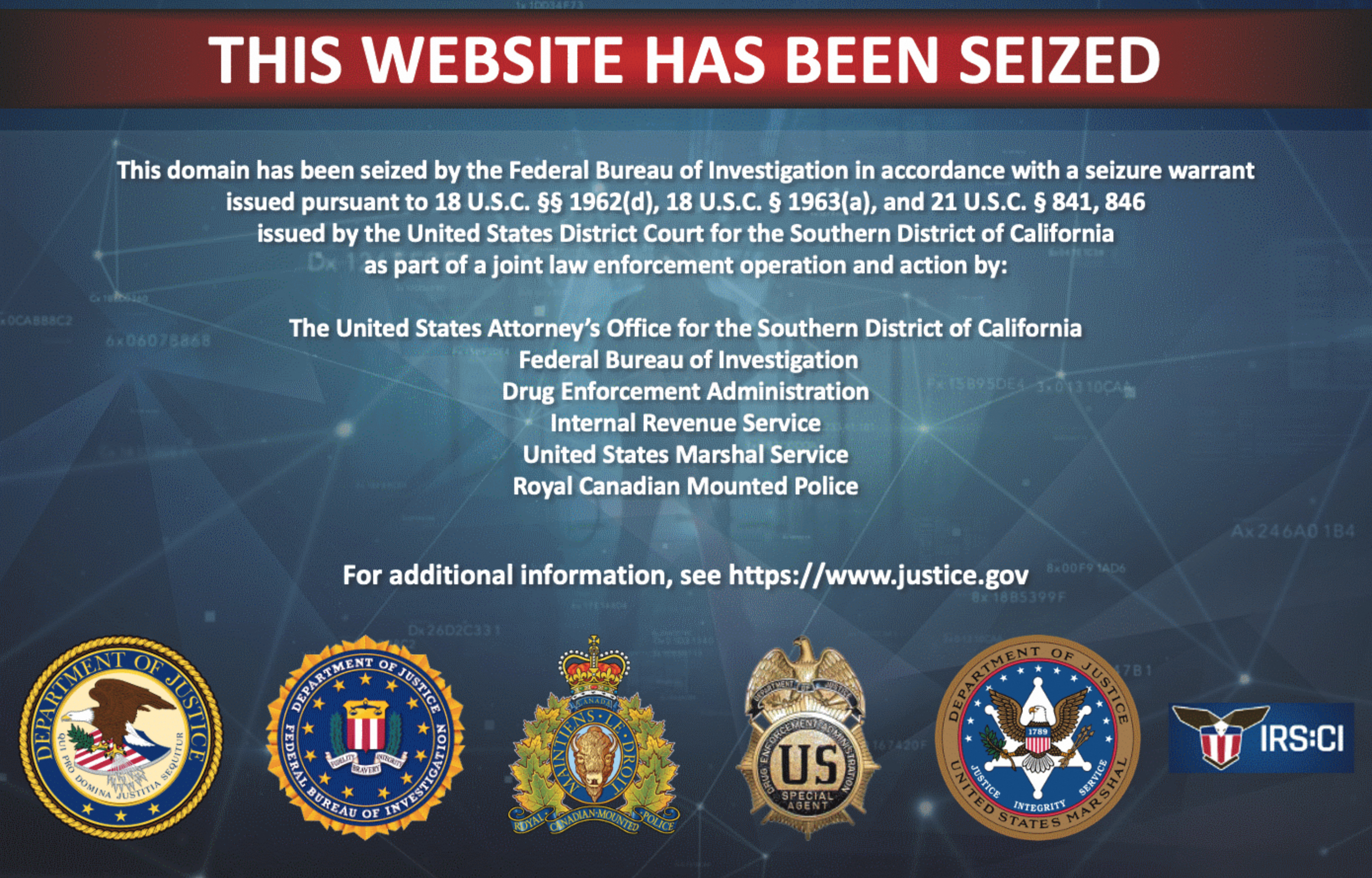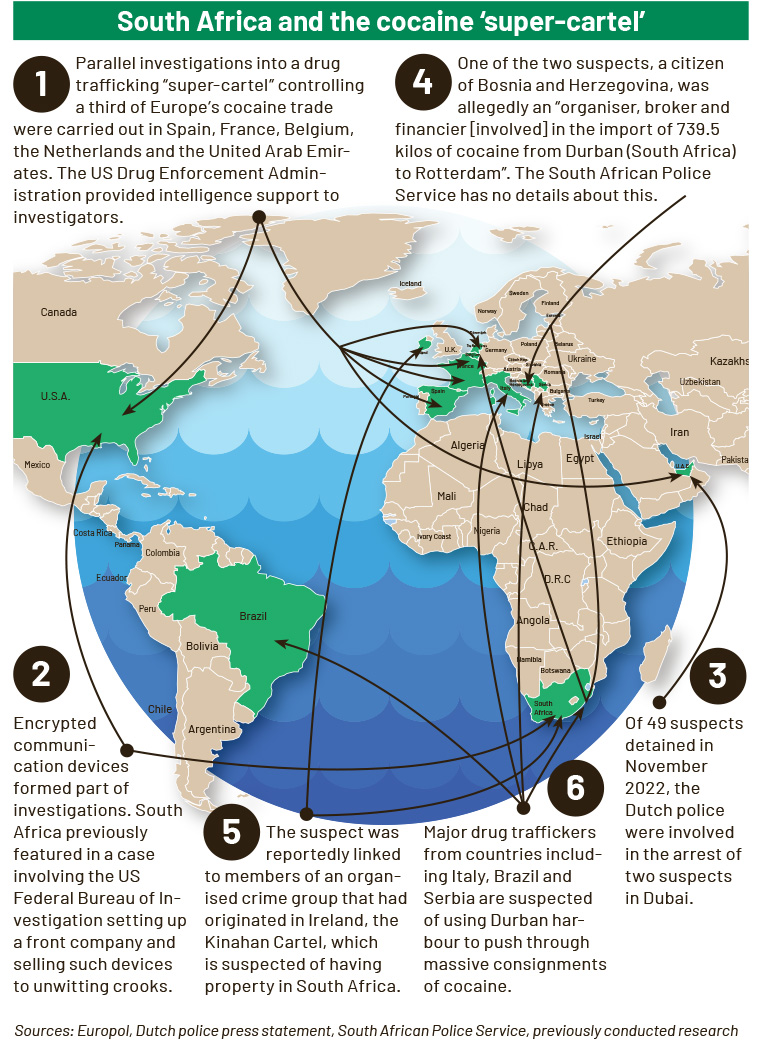ORGANISED CRIME
Busted – a global ‘super cartel’, encrypted message crackdown and cocaine trails to Durban

In November, police in Europe and other countries took down what they described as a ‘super cartel’ dominating the world’s cocaine trade. It seems the crackdown has a trail that leads all the way to Durban, South Africa’s port city known for mass drug busts.
A powerful international drug cartel said to control a third of Europe’s cocaine trade was dealt a blow late last year when 49 arrests were carried out in several countries.
No suspects seemed to be detained, or identified, in South Africa.
However, a clue, in the form of a sentence in a Dutch police press release, suggests the “super cartel” has been operating through this country. An arrested suspect’s alleged activities pointed to this.
The SA cocaine conduit
The clue in the Dutch police statement is the mention of Durban. Daily Maverick has previously reported that Durban harbour is used by major drug trafficking cartels, including Brazil’s Primeiro Comando da Capital (PCC).
A suspected leader of the PCC, Gilberto Aparecido dos Santos, previously hid out in South Africa and was later arrested in Mozambique in 2020.
In October last year, in Brazil, he was sentenced to 26 years in jail for trafficking.
The book Clash of the Cartels: Unmasking the Global Drug Kingpins Stalking South Africa details how drug traffickers from various countries, including Brazil, Italy and Serbia, sometimes working together, use Durban harbour as a node for cocaine smuggling.
South Africa’s Parliament heard in November that Durban was “the largest and busiest shipping terminal in sub-Saharan Africa” and handled “up to 31.4 million tons of cargo each year”.
Local cops unaware of links
This week, South African Police Service spokesperson Brigadier Athlenda Mathe told Daily Maverick SAPS officers knew nothing about criminal activities in Durban and the port’s alleged links to a suspect arrested by Dutch counterparts as part of the “super cartel”.
“All the air, sea and land ports of entry in KwaZulu-Natal are not aware of the mentioned individual and have not detected anything that is unlawful or illegal linked to the mentioned subject,” she said.
Sources linked to security have long questioned whether officials linked to policing and other activities at Durban harbour are being paid off to ensure drugs pass through smoothly.
Hawks spokesperson Katlego Mogale previously confirmed to Daily Maverick: “Police officers have … been arrested in cocaine interceptions, particularly related to Durban. [A] special task team has been assigned to conduct investigations which are ongoing and still sensitive.”
Sinking a ‘super cartel’
In the recent “super cartel” crackdown, the EU’s law enforcement agency Europol said that between 8 and 19 November, a series of coordinated raids were carried out in Europe and the United Arab Emirates (UAE).
A total of 49 suspects were arrested.
Europol’s statement said: “The drug kingpins considered as high-value targets by Europol had come together to form what was known as a ‘super cartel’ which controlled around one third of the cocaine trade in Europe…
“The scale of cocaine importation into Europe under the suspects’ control and command was massive and over 30 tonnes of drugs were seized by law enforcement over the course of the investigations.”
Investigations that led to the arrests were carried out in Spain, France, Belgium, the UAE and the Netherlands.
Two decades ago, the Netherlands was known as a destination from which ecstasy was smuggled to South Africa, and to where cannabis was sent from this country.
Dutch cops and Durban
In the cartel crackdown, the Netherlands arrested two “high-value targets” in Dubai – widely reported to be Ridouan Taghi, who has ties to Morocco, and Edin “Tito” Gacanin, who was born in Bosnia.
Gakanin reportedly had links to an Irish organised crime group, the Kinahan Cartel, whose members are suspected to own properties in various countries, including South Africa.
A Dutch police statement said “a 40-year-old Dutchman, who is also a citizen of Bosnia and Herzegovina” – presumably Gacanin – was detained in Dubai on suspicion of importing mass consignments of cocaine and preparing to import “raw materials for the production of amphetamine”.
The statement said the interception of encrypted messages from a platform known as Sky, an apparent reference to SKY ECC, resulted in his arrest.
“Because of the Sky chats, it is also suspected that the man was involved as organiser, broker and financier in the import of 739.5 kilos of cocaine from Durban (South Africa) to Rotterdam”, the Dutch police statement said.
The arrest of a suspect with ties to a Balkan country and who apparently has connections to Durban amplifies suspicions that cartels linked to countries, including Serbia, are operating in South Africa.
Crooks fell for a front company
Encrypted communication devices have resulted in other arrests relating to mass cocaine smuggling in South Africa.
Daily Maverick previously reported on a case in which arrests were made in connection with R400-million worth of cocaine was found in the hull of a ski boat in Pretoria.
That crackdown came about in part due to the US FBI’s Operation Trojan Shield and the Australian Federal Police’s Operation Ironside. Trojan Shield involved the FBI secretly operating its own encrypted device company, called Anom.
Anom saw criminals across the world using encrypted communications on the black market, which, unknown to them, the FBI was lawfully bugging.
Hacked versus phishing
In the “super cartel” case, SKY ECC denied wrongdoing.
In March 2021, the company issued a statement saying allegations that Dutch authorities had hacked its software were false. It effectively claimed that a platform mimicking it had been created.
The company’s statement said: “SKY ECC authorised distributors in Belgium and the Netherlands brought to our attention that a fake phishing application falsely branded as SKY ECC was illegally created, modified and side-loaded onto unsecure devices, and security features of authorised SKY ECC phones were eliminated in these bogus devices which were then sold through unauthorised channels.”
Sky ECC’s CEO Jean-Francois Eap was quoted saying: “SKY ECC believes that the individual right to privacy is paramount for anyone acting within the law.”

A screengrab of the Sky Global website. The company’s chief executive and an associate were indicted in the US in 2021 for allegedly selling encrypted communication devices that facilitated global drug trafficking. Image: Supplied
Drug dealing and encrypted devices
Four days after that statement in March 2021, the US Attorney’s Office for the Southern District of California, announced that Eap, who it said headed the Canada-based company Sky Global, along with an associate of the firm, Thomas Herdman, had been indicted.
This was for allegedly facilitating “the transnational importation and distribution of narcotics through the sale and service of encrypted communications devices”.
“There are at least 70,000 Sky Global devices in use worldwide,” a statement by US authorities said. “The indictment alleges that, for more than a decade, Sky Global has generated hundreds of millions of dollars in profit by facilitating the criminal activity of transnational criminal organisations and protecting these organisations from law enforcement.”
This week, the landing page of Sky Global’s website still had a notice saying: “This website has been seized.”
It said the FBI had seized the domain in accordance with a search warrant. DM168
This story first appeared in our weekly Daily Maverick 168 newspaper, which is available countrywide for R25.























 Become an Insider
Become an Insider
I think and hope that much of the crypto market is actually, just like that encrypted messaging setup, a honey trap. If FBI/Interpol do actually run whatever crypto exchange, they do know exactly who paid and received what and can eliminate the offending crypto. It is not just the crooks that can be clever and use technology 😉
Great work ,too many people involved in ruining lives and families for profit.
There is nothing substantive in this article to justify reference to Durban nor to refer to it in the headline as being a huge transit port for international drug dealings. Sadly, involving Durban and South Africa, generally, in stories about drugs is this writer’s stock in trade, and probably sells very well, but in the absence of factual evidence as opposed to unsubstantiated allegations and speculation, unnecessarily only serves to fuel the constant negative narrative about this country. And, by the way, the book Clash of the Cartels (which the writer refers to as authority for these allegations as if it was written by some independent expert by failing to disclose that she is the author) is similarly long on speculation and unsubstantiated allegations but very short on evidence and proper corroboration and is not worth reading. I hope that you will not again republish this article.